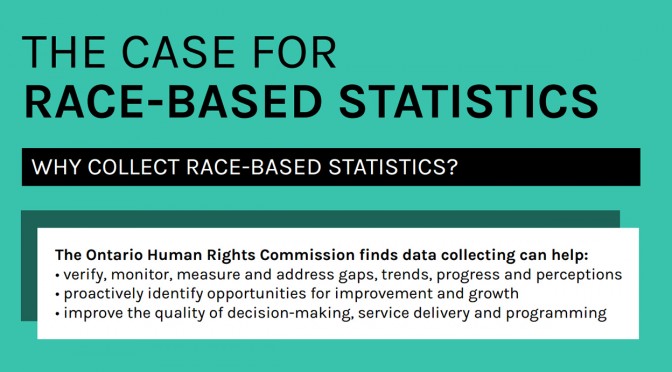Why collect race-based statistics?
The Ontario Human Rights Commission finds data collecting can help:
- verify, monitor, measure and address gaps, trends, progress and perceptions
- proactively identify opportunities for improvement and growth
- improve the quality of decision-making, service delivery and programming
Examples of why collecting data is a good idea:
- Prevent or address systemic barriers to access and opportunity
- Plan special programs
- Improve equitable service delivery and programs
What the numbers are telling us
LAO currently doesn’t collect data about the race of applicants or clients, but we do rely on secondary data about race. Here’s how stats shed a light on our services in the various areas of law that we cover.
About the child welfare system:
- Ontario’s children’s aid societies have agreed to collect race data to help figure out the needs of Black and Aboriginal families
- 42% of youth in care of the Children’s Aid Society of Toronto are Black, but only 8.2% of the city’s under 18 population is Block.
- 23% of children in care province-wide are Aboriginal, but only 2.5% of Ontario’s under 19 population is Aboriginal.
About school disciplinary hearings:
- Not all Ontario school boards collect data on race and suspension rates
- Toronto District School Board data revealed that Black students are suspended disproportionately compared to white students
- LAO will provide funding to two organizations to help Black students who are suspended and facing expulsion hearings
About the bail system:
- Racialized and Aboriginal people face more over-policing practices and racial profiling
- Racialized and Aboriginal people are more likely to find themselves in pre-trial detention
- 13% of the remand detention population is Aboriginal but only 2% of Ontario’s population is Aboriginal
How collecting race-based data could help LAO
LAO currently doesn’t collect statistics on applicants’ or clients’ race. Understanding data, however, could help us understand how we can help improve the outcomes of racialized communities when they come into contact with the justice system.
Additionally, we can:
- document and study systemic discrimination in the justice system
- remove barriers people face when accessing our services
- tailor programs to address client needs
Next steps:
In early engagement sessions, LAO has repeatedly heard about the need to collect data about clients’ race.
LAO has begun the process of figuring how to gather and analyze this data. Updates will be provided as more information becomes available.
Sources
- Ontario Human Rights Commission’s paper: “Count Me In! Collecting human rights-based data.” http://www.ohrc.on.ca/en/count-me-collecting-human-rights-based-data?page=count-1_.html
- Ontario Association of Children’s Aid Societies. “How collecting race-based data can dramatically improve child welfare services.” http://www.oacas.org/2016/02/how-collectingrace-based-data-can-dramatically-improve-child-welfare-services/
- Canadian Race Relations Foundation. “A national policy on the collection of race-based statistics.” http://www.crrf-fcrr.ca/en/component/flexicontent/292-policies-and-research/ 23598-a-national-policy-on-the-collection-of-race-based-statistics
- Statistics Canada. “Ethnic diversity study.” http://www23.statcan.gc.ca/imdb/p2SV.pl?Function=getSurvey&SDDS=4508
- Commission on Systemic Racism in the Ontario Criminal Justice System. “Report on the Commission on Systemic Racism in the Criminal Justice System.” http://archive.org/details/reportracismont00comm
- Statistics Canada. “Admissions to adult correctional services in Canada, 2011/2012.” http://www.statcan.gc.ca/pub/85-002-x/2014001/article/11918-eng.htm
- Toronto District School Board. “Caring and Safe Schools Census.” http://www.tdsb.on.ca/Portals/research/docs/reports/CaringSafeSchoolsCensus201112.pdf

